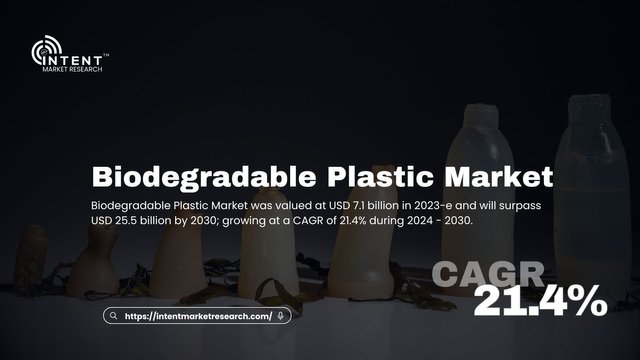Biodegradable Plastic Market Expansion: Transforming Global Industries by 2030

In a world grappling with the environmental consequences of traditional plastics, biodegradable plastics emerge as a game-changer. According to Intent Market Research, the biodegradable plastic market is projected to grow significantly, from USD 7.1 billion in 2023 to a staggering USD 25.5 billion by 2030, at a compound annual growth rate (CAGR) of 21.4%. This meteoric rise reflects the increasing emphasis on sustainable alternatives and stringent environmental regulations.
What Are Biodegradable Plastics?
Biodegradable plastics are eco-friendly materials designed to decompose naturally in the environment, typically with the help of microorganisms. Unlike conventional plastics, which can take hundreds of years to break down, biodegradable plastics can return to the earth in months, depending on environmental conditions.
Download Sample Report @ https://intentmarketresearch.com/request-sample/biodegradable-plastic-market-3046.html
Why the Shift to Biodegradable Plastics?
Environmental Awareness: People are becoming increasingly conscious of the environmental impact of single-use plastics.
Government Regulations: Many countries are implementing policies and bans on traditional plastics to combat pollution.
Corporate Responsibility: Businesses are pivoting towards sustainable practices to align with consumer expectations and legal requirements.
Key Drivers of Market Growth
Stringent Environmental Policies
Governments worldwide are introducing bans on non-degradable plastics, fostering a supportive regulatory environment for biodegradable alternatives. For instance, the European Union’s Single-Use Plastics Directive promotes alternatives like biodegradable products.Rising Consumer Awareness
Consumers are actively seeking products that reduce their ecological footprint. Biodegradable plastics, often marketed as green alternatives, are gaining popularity in packaging, agriculture, and textiles.Innovations in Bioplastics
Continuous R&D in biodegradable plastics has led to innovations like polylactic acid (PLA) and polyhydroxyalkanoates (PHA). These materials offer durability and versatility comparable to conventional plastics.Increasing Adoption in Packaging
The packaging industry, one of the largest contributors to plastic waste, is rapidly transitioning to biodegradable solutions. Food packaging, in particular, benefits from materials that break down without contaminating the environment.
Market Segmentation
By Type
Polylactic Acid (PLA): Popular for its transparency and strength, used in food packaging and 3D printing.
Starch-Based Plastics: Widely used in compostable bags and disposable cutlery.
Polyhydroxyalkanoates (PHA): Known for their versatility, used in medical and agricultural applications.
Others: Includes PBAT and PBS, often blended for enhanced properties.
By Application
Packaging: From food wraps to shipping materials.
Agriculture: Mulch films and seed coatings that decompose post-use.
Textiles: Sustainable clothing and accessories.
Consumer Goods: Biodegradable cutlery, bags, and bottles.
Challenges in the Biodegradable Plastic Market
High Production Costs: Biodegradable plastics are often more expensive than their conventional counterparts.
Limited Industrial Composting Facilities: Lack of infrastructure hampers large-scale adoption.
Misleading Labels: Some products marketed as biodegradable may not fully decompose, leading to consumer skepticism.
Access Full Report @ https://intentmarketresearch.com/latest-reports/biodegradable-plastic-market-3046.html
Regional Insights
North America: The U.S. and Canada are front-runners due to stringent regulations and strong consumer demand for sustainable products.
Europe: The European Union's strict policies make it the largest market for biodegradable plastics, with countries like Germany and France leading the way.
Asia-Pacific: Rising awareness and government initiatives in countries like China, India, and Japan are driving significant growth in the region.
Latin America & Middle East: These regions are showing steady growth as awareness and infrastructure for sustainable products expand.
Future Outlook: A $25.5 Billion Opportunity
The biodegradable plastic market's growth trajectory highlights its transformative potential. As technology advances and production costs decrease, these eco-friendly alternatives will become more accessible, further accelerating their adoption across industries.
FAQs
What industries benefit most from biodegradable plastics?
Industries like packaging, agriculture, textiles, and consumer goods are the primary beneficiaries of biodegradable plastics.Are biodegradable plastics completely eco-friendly?
While they are significantly better than conventional plastics, proper disposal methods like composting are essential for maximizing their benefits.How long do biodegradable plastics take to decompose?
Decomposition times vary but generally range from a few months to a few years, depending on environmental conditions.What are the leading companies in the biodegradable plastic market?
Major players include NatureWorks, BASF, Total Corbion, and Novamont.How can consumers support the growth of biodegradable plastics?
By choosing products made from biodegradable materials and advocating for better waste management infrastructure.
About Us
Intent Market Research (IMR) is dedicated to delivering distinctive market insights, focusing on the sustainable and inclusive growth of our clients. We provide in-depth market research reports and consulting services, empowering businesses to make informed, data-driven decisions.
Our market intelligence reports are grounded in factual and relevant insights across various industries, including chemicals & materials, healthcare, food & beverage, automotive & transportation, energy & power, packaging, industrial equipment, building & construction, aerospace & defense, and semiconductor & electronics, among others.
We adopt a highly collaborative approach, partnering closely with clients to drive transformative changes that benefit all stakeholders. With a strong commitment to innovation, we aim to help businesses expand, build sustainable advantages, and create meaningful, positive impacts.
Contact Us
US: +1 463-583-2713